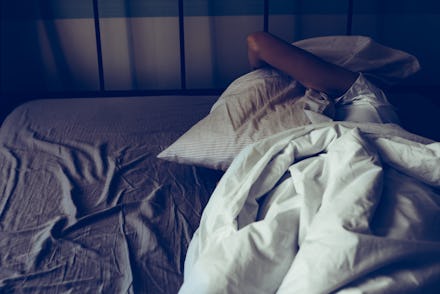The trick to a great night’s sleep? Don’t try so hard

I’m not good at sleeping. It seems like a borderline absurd thing to be bad at — what am I, five? — but it's true. The problem isn’t so much in the sleeping, per say, but in the falling asleep part. It’s like as soon as my body slows down, my brain speeds up and I suddenly have all the great ideas that eluded me all day. But trying to force myself to sleep seems to have the opposite effect, and the harder I try, the less I sleep. I asked doctors to explain why forcing yourself to fall asleep doesn’t work and what we can do instead.
Forcing sleep is a doomed quest for several reasons. “Trying to make yourself sleep activates your conscious mind, which is exactly the opposite of what we want when trying to settle in for the night,” says Chris Airey, a London-based internal medicine physician. Sleep is not a state you can think your way into. In fact, thinking too hard about sleep is part of the problem. “Thinking about your inability to sleep may make you more anxious and contribute to keeping you awake,” Airey says.
To transition to sleep, your mind needs a chance to slow down. This is not a metaphor; it’s a physiological process. “As we transition to sleep, the firing of cortical neurons in our brain slows down, and allows our mind to ease into a state of sleep,” Peter Bailey, a family physician in Oakland, tells me. That’s why we often feel like we are drifting off to sleep, he explains. “Falling asleep is the process of the brain slowing down on a physiological level,” he says. So laying in bed focusing on falling asleep and even thinking, “fall asleep, fall asleep, fall asleep,” won't work because by consciously thinking you’re making the neurons in your brain fire faster, not slower, says Bailey.
Your mind and body have to be in a state of relaxation in order to sleep. Relaxation, when used as a scientific term, indicates the physical slowing down of processes after a period of tension or activity. Because it’s a real physical phenomenon, no matter how much we tell ourselves that some of the screen-based things we do to fall asleep — like watching TV or scrolling Insta — relax us, it’s not actually true on a physical level. Screens are stimulating, even if whatever’s on them seems enjoyable and chill. Our bodies can’t help but respond to the light they emit, so if you actually want to sleep, turn off those reruns of The Office.
So, what should you do if you really want to sleep and you just can’t? Give up. “Don't lie in bed all night tossing and turning,” he says. “It is better to leave the bedroom and read a boring book.” Sometimes just changing your environment will help you nod off. This rings true to me. When I inadvertently fall asleep, it’s usually someplace I don’t usually sleep, like my couch.
The other thing is that because sleep requires a reduction in physical activity, it helps if you are getting some activity to start with. Exercise, it turns out, is important for sleep, not just because it tires you out — which helps your body get into a state of relaxation — but because when you exercise, your body produces hormones that are calming, says Bailey. You don’t have to do an intense workout to enjoy good sleep, he explains, almost any sort of physical exercise will help your sleep to some degree.
Sleep seems like something that shouldn’t be rocket science, but it is, in fact, a scientific phenomenon. For me, that feels pretty liberating. If I can’t sleep, it’s not a character defect or anything, it just means the physical conditions aren’t exactly right for relaxation. That seems like a very solvable problem — as long as I don’t try to think too hard about solving it right before bed.